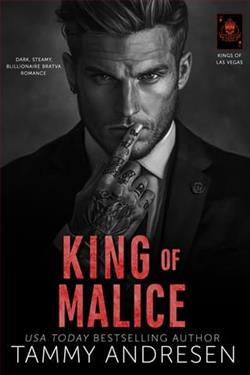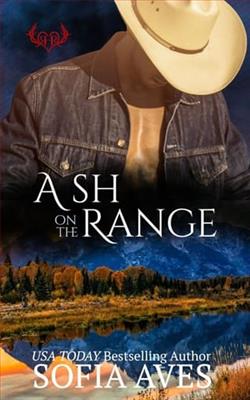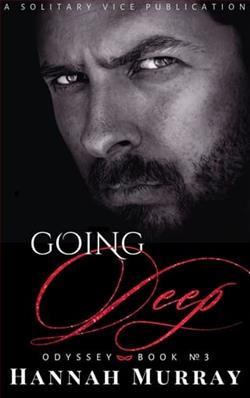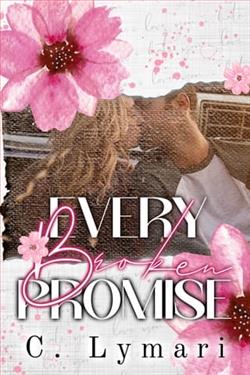Page 44 of Warrior Queen
For a moment, nothing happened. Then, from the quiet shadows, Merlin’s whispered voice echoed around the walls, the words spilling out like a tumbling river in a language I didn’t understand. A shiver ran down my back and goosepimples prickled my skin. Beside Morgana, Arthur stood up straight, his body suddenly stiffening.
Magic. The words rolled around the room, sibilating into every impenetrable corner, climbing the walls, pooling at our feet.
Morgana struggled and made furious impotent noises, but the whispering went on.
I staggered back to Arthur on unsteady feet and grabbed his hand again. Around us the shadows seemed to have life, dancing across the walls. What was going on? What was Merlin doing?
Morgana looked as though she was about to have an apoplectic fit. Maybe she knew something we didn’t.
The air felt heavy and oppressive, the darkness alive with echoes of the whispered words.No. I didn’t believe in magic. But what was this if it wasn’t magic?
Arthur’s hand in mine felt hot and sweaty. I held it tight, afraid of what Merlin’s unfriendly conjured shadows might do, my breath coming fast and shallow.
The single candle guttered, the flame leapt upward, then died, plunging the room into total darkness. Arthur pulled me toward the still open door, out of the oppressive air and into the freshness of the night. A moment later, Merlin staggered out, his arms empty. I had the distinct feeling that even if I asked, he wouldn’t tell me what he’d done.
“This way,” Arthur said, pushing the door closed behind us. We ran back to the servants’ door and into the maze of passageways, leaving Morgana and her strange child behind. I longed to ask Merlin what he’d done in those few minutes of creeping magic, but we didn’t have time to stop and talk. At any moment, a servant might find Morgana and set her free to raise the alarm.
Our horses were waiting patiently for us in the now empty forum. All we had to do was get out of the gates, and Arthur had a plan for that.
From the bag he brought out a bell, and, leading our horses, we staggered drunkenly down the road toward the gates, schooling our anxious feet not to hurry. He led the way, and as he went, he rang the bell every so often. The sign for a leper. All three of us kept our tatty hoods pulled well forward, hiding our faces just as lepers would. But all the same, my heart hammered harder, the nearer we drew to safety.
With the gates in sight, Arthur rang the bell more often. We crawled slowly closer, shuffling along the cobbles. The gate guards drew back in disgust and fear as we approached. Darkness was our friend. Only a single torch burned on either gate tower, the road a pool of black shadows.
“Lepers comin’,” shouted one of the guards.
A door on the walkway opened and a man stepped out, possibly their commander. He peered down into the street. “Get them gates open quick, and let ’em out,” he shouted down. “How’d they get in, in the first place, I’d like ter know. What you all been doin’ today, sleepin’ on the job?”
“You lot keep back,” the guard called to us, as he swung one side of the gates open. “Doncha come near me.”
Heads down, trudging, Arthur remembering to limp, we plodded through the gates, and they slammed shut behind us.
Chapter Fifteen
Romano-British Caer Ebrauc,that would one day become modern York, stood on low-lying land on the banks of the River Usa, probably prone to just as much flooding as Caer Gloui. But the canny Romans had chosen the slightly higher ground to the south of the river for their city, and to the north had built their legionary fortress. A substantial stone bridge crossed the river between the two, but the fortress had long since fallen out of use, the walls robbed out for farm buildings and field boundaries, the barracks empty shells.
The city walls, however, rose up as high and impregnable as those at Viroconium. At intervals, stout towers pointed skyward, manned by armed guards, their spear tips visible, like a small forest, above the main south gates. Bits of the white render had fallen away in places, but no stone robbing had gone on here.
We approached at nightfall, from the southwest. Having bypassed a number of deserted and ruined Roman towns, we’d crossed eastwards over the high moorland of what would one day be called the Peak District and the Pennine ridge, before descending toward the lower lying, richer farmlands of the east coast. And now we’d come at last to Ebrauc.
I’d been here once before, on my way north to join Arthur at the Wall, when Amhar had been a baby. But my stay had been brief, and in a mansio. I’d not met with King Coel at all, nor even laid eyes on his palace.
As our army was so large, Cei organized a camp outside the city walls on the open grazing lands. Then, with just a small party of ten, we approached the gates. The guards on the walls and towers who’d been watching us, peered over as we drew nearer. But evidently someone had warned the men down below to expect us, because the huge gates creaked open to let us pass inside.
Riding between Arthur and Cei, with Merlin just behind, I stared about myself in curiosity, not having had much opportunity to see the city on my last visit, as it had been dark when we’d arrived and very early morning when we’d left.
The once perfect grid system of roads the Romans had built their houses around had largely been lost as those houses fell into ruin. Many of the grander dwellings seemed to have been divided into smaller units, and their tiled roofs had given way to thatch, in places blackened by age and in dire need of renewal. Open areas marked where buildings, that might have begun by falling down, had been completely demolished to make way for gardens, pigpens, and stables. The smell of the farmyard hung over the city in a heavy pall, and busy hens scratched about everywhere in the waste that lay discarded in the streets.
The tumbledown decay reminded me sharply of Caer Baddan, and yet an air of vitality clung to this city that Caer Baddan didn’t possess. The people in the streets, hurrying about their business, or hawking their wares to passers by, seemed more cheerful, better dressed, and had a healthy robustness about them. The raised voices of street vendors, the laughter of children running through the maze of dirty side lanes that opened off the main thoroughfare, and the barking of dogs filled the evening air. Smoke twisted up from a myriad of hearth fires to mingle with the earthy stench of animal droppings and the strong ammonia from the stale urine running in the gutters.
The city stank of post-Roman Britain. If I could have bottled that familiar odor, I would have called it Eau de Ville– town smell. How different from the pervading fug of poisonous exhaust fumes in the towns and cities of my old world. I knew which I preferred.
In common with the practice of many of his fellow kings who’d held onto Roman towns and cities as their strongholds, Coel had taken what remained of the largest house for his palace. It sprawled over the highest ground in a maze of courtyards, corridors, and rooms, and might once have been two or three neighboring properties, for all I knew.
His palace stables occupied long, low, thatched buildings grouped around a cobbled courtyard. Here, we dismounted and left our horses in the care of a crowd of eager servants. Perhaps they knew why we’d come. The news that a large army had set up camp outside the city walls must have flown around the city like wildfire.
A tow-headed servant boy led us along several narrow corridors, across a small, dingy courtyard and finally into what must have been the main part of the palace. Around a wide, paved courtyard, with a huge fountain playing in the center, rows of doors opened off a colonnaded walkway. Much like the palace at Viroconium. In fact, much like most large houses left behind by the Romans. The boy stopped outside the most splendid of the doors and knocked.
The door swung open, and he gestured to us to go inside, bowing low.















